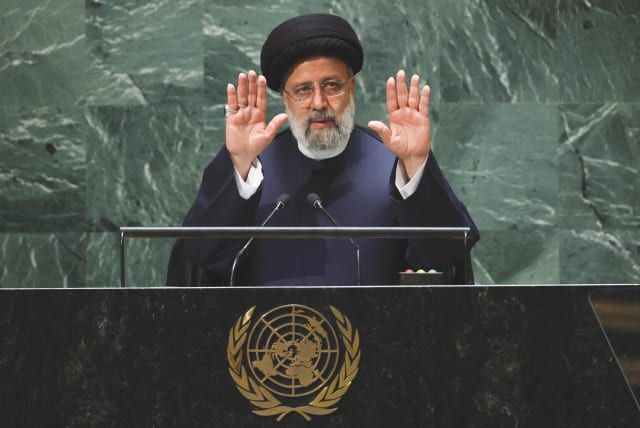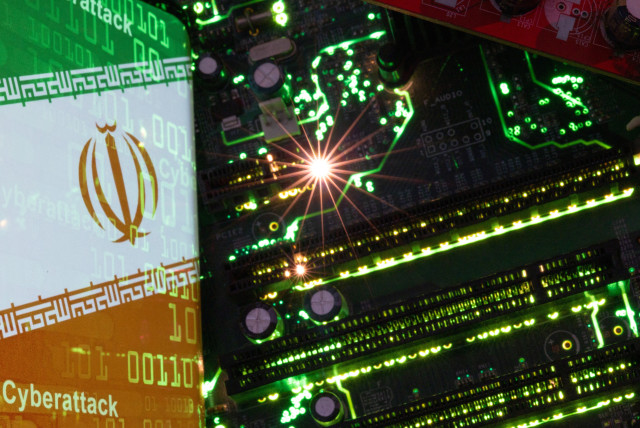Iran’s cyberattacks on Israel target the pillars of democracy - opinion

Iran’s enmity toward Israel has always been about more than just geopolitics: It’s also ideological and existential.
In a world where battles are increasingly fought with codes and clicks rather than cannons and caliber, the silent front of cyberwarfare continues to surge. This month, a brazen digital assault by the Islamic Republic of Iran laid bare the personal data of countless Israelis, casting a shadow over pivotal diplomatic negotiations and the proceedings of the UN General Assembly. As technology further embeds itself into our lives, the lines of traditional geopolitics blur, giving rise to new, invisible battlefields.
Navigating the complex geopolitical landscape of the Middle East often leads one through a maze of missile strikes, regional proxy wars, and escalating nuclear ambitions. However, as technology propels us forward, attention must be redirected to an emerging covert arena: the digital realm. The blend of Iran’s sophisticated cyber capabilities and its unyielding stance against Israel sketch a concerning blueprint, one pointing towards a greater objective – destabilizing the very pillars of democracy.
To any astute analyst, Iran’s cyberattacks on Israel are far more significant than mere blips in the virtual landscape. As Suzanne Maloney, a senior fellow at the Brookings Institution, observed through her research, Iran’s confrontational stance towards Israel is not limited to conventional battlefields. It’s deeply intertwined with an ideological battle that stretches beyond political discord, delving into anti-Zionism and even antisemitism. Iran’s enmity toward Israel has always been about more than just geopolitics: It’s also ideological and existential.
Iran's calculated efforts to destroy Israel from the inside out
Iran’s digital strategies are not just symbolic displays of power but calculated moves designed to erode the Israeli societal fabric from the inside out. As reported by the Center for Strategic and International Studies (CSIS), these cyber initiatives aim to “disrupt Israeli daily life, demoralize the Israeli citizenry, and erode trust in the Israeli government’s ability to protect its people.”
Iran’s online aggression is but one aspect of a much broader and comprehensive strategy. Kenneth Pollack, a renowned Middle East researcher, underscores how Iran’s bellicose rhetoric also serves a dual purpose. Pollack suggests that “Iran uses its inflammatory rhetoric towards Israel as both a domestic rallying point and as a means of regional influence.”

Although Israel has long been elected as the Iranian regime’s favored and primary target – the enemy to be struck down, Tehran’s hatred also reflects its enmity towards what the Jewish state represents. As Dr. Michael Rubin of the American Enterprise Institute astutely noted, “Iran’s actions reflect a broader ideological confrontation with the cornerstones of democratic societies: independence, democracy, and freedom.”
When Iran strikes at Israel, Prof. Amy Zegart of Stanford University underscores that “it’s not just a political move against a nation-state; it’s a direct affront to the bedrock of democratic principles.”
As Israel demonstrates fortitude in the face of these challenges, Prof. Ian Bremmer of the Eurasia Group cautions Western democracies: “Israel’s plight is a canary in the coal mine. The vulnerabilities it faces today could be those the West confronts tomorrow.”
In light of this, it’s crucial for democratic nations to recognize their shared stake in these cyber onslaughts and to bolster their defenses accordingly.
Historically, Iran’s forays into cyber warfare can be traced alongside a timeline of significant geopolitical events, revealing a discernible pattern of aggressive digital behavior often in tandem with, or in response to, major international occurrences.
In 2010, the world bore witness to the Stuxnet Worm’s devastating capabilities, a cyber weapon largely believed to have been jointly developed by the US and Israel to sabotage Iran’s nuclear program. This unprecedented attack marked a new era in cyberwarfare, and Iran took note (See Kim Zetter’s 2014 book, Countdown to Zero Day).
Then, following the US’s withdrawal from the JCPOA in 2018, Iran was linked to the launch of Shamoon, a data-wiping malware that had previously targeted Saudi Aramco in 2012, seemingly as an immediate and defiant digital counter-strike.
In 2019, amid tensions surrounding attacks on oil tankers in the Gulf of Oman, reports emerged of Iranian hackers targeting US government officials in a spear-phishing campaign, further reiterating the synchronization of digital offenses with heated political events (US Department of Justice, 2020).
From 2021 to 2022, audacious cyber operations led to the exposure of the personal data of countless Israeli citizens. Those actions came amid stalled diplomatic talks and ahead of a crucial UN General Assembly session, signaling a familiar pattern where Iran bolsters its negotiation position through aggressive digital actions.
TAKEN TOGETHER, these instances paint a picture of Iran’s evolving ideological trajectory. Far from being isolated incidents, they underscore how Tehran has continually leveraged cyber operations both as retaliatory measures and as strategic tools to coincide with, and potentially influence, significant diplomatic events.
The pattern is alarming. By aiming their cyber weapons at Israeli water chlorine levels, medical institutions, and even job seekers’ databases, Tehran shows its intent to exploit any vulnerabilities. This means Western democracies, with their ever-increasing digital infrastructures, are equally at risk.
Moreover, as evidenced by Iran’s recent rhetoric, this cyber warfare extends beyond mere technological confrontations. Statements by leaders like Ayatollah Ali Khamenei, predicting Israel’s non-existence within 25 years, or the troubling trivialization of the Holocaust through controversial cartoon contests, signify a clear and dangerous ideological bent. Such sentiments not only challenge Israel’s legitimacy but also echo deeper antisemitic undertones.
If left unchecked, these dual threats – digital and ideological – could coalesce into a formidable challenge to the pillars of democracy. For the United States, which has already experienced the disruptive power of cyberattacks, understanding Iran’s multifaceted approach is crucial. US policymakers must ensure a holistic approach that mitigates threats in the cyber domain while challenging Iran’s divisive and harmful narratives.
In a world where digital warfare can significantly influence geopolitics, it’s essential to remember that at its heart, this is more than just ones and zeros. It’s an ideological battle, one that challenges the principles of democracy and freedom.
As we tread cautiously into this digital age, the US, together with its allies, must stand resolute against those who seek to erode these cherished values.
The writer is director of Forward Strategy and a research fellow at the American Center for Levant Studies (ACLS).
